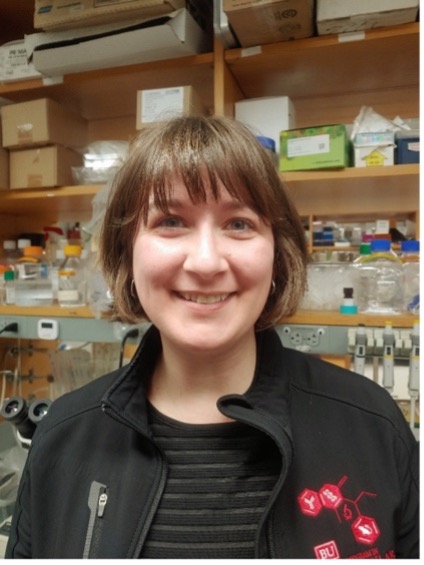GMS PhD Spotlight: Chelsea Webber
 Chelsea Webber is a degree candidate in the GMS PhD Program in Biomolecular Pharmacology. Her dissertation research in the lab of Professor of Pharmacology, Physiology & Biophysics Benjamin Wolozin, MD, PhD, focused on ways to decrease the overactivation of immune response in neurodegenerative diseases. Chelsea defended her dissertation in March 2024 and will graduate in May 2024. Read more about Chelsea below!
Chelsea Webber is a degree candidate in the GMS PhD Program in Biomolecular Pharmacology. Her dissertation research in the lab of Professor of Pharmacology, Physiology & Biophysics Benjamin Wolozin, MD, PhD, focused on ways to decrease the overactivation of immune response in neurodegenerative diseases. Chelsea defended her dissertation in March 2024 and will graduate in May 2024. Read more about Chelsea below!
What did you complete your dissertation research on and how did you settle on that topic?
In neurodegenerative diseases, there is an increase in immune responsiveness. My dissertation research focused on ways to decrease this overactivation. One of my research projects was an extension of one of my lab’s main focuses, which is on RNA-binding protein biology. I found that one RNA-binding protein, TIA1, was crucial for activation of the brain’s immune response, and by knocking out TIA1, we can reduce protein aggregation. The second project was actually my qualifying exam proposal. In this project, I took advantage of the innate function of viral proteins to inhibit the stress response without disrupting the physiology of the cell.
Why did you choose to do a PhD?
I actually didn’t know that I wanted to do a PhD until about six years after graduating from my undergraduate college. I was working as a technician in a neuroscience lab during those years and really enjoyed conducting bench research, the collaborative aspect of a lab, and the passion that everyone shared for discovery. I applied to PhD programs after deciding that I’d like to stay in this field but first needed to learn more to be a successful researcher.
How would you describe a typical day as a PhD student?
I don’t know if there is a typical day – that is actually one of the things that keeps research and lab work so engaging.
What is one of your best memories from the time in your PhD?
My best memory was my wedding right before starting my second year. I was so fortunate to get married before COVID and to be able to celebrate with many of my new graduate school friends.
Did you face any unexpected challenges during your time in your program? How did you overcome them?
The COVID pandemic started during my second year and continued through my third year. It definitely brought a lot of challenges, including limiting the number of hours I could spend in lab, not being able to attend conferences in person, supply chain issues for common lab reagents and plastics, and a real disconnect from my lab members and friends. I don’t know if I overcame anything so much as weathered it by trying to accept and adjust to all the changes.
What are your next steps and your plans for your future?
I will be starting a postdoctoral fellow position at UT Austin conducting neuroscience research in C. elegans this summer. I hope to become a college professor that can inspire the next generation of scientists.
Is there anyone in your life who inspired your decision to pursue this career path?
The faculty and staff in the biology department of my alma mater, Simmons University, provided numerous opportunities for me to get involved in science, including being a teaching assistant for lab courses, working as an animal technician, and conducting my thesis research. I really have them to thank for introducing me to the world of science.
Do you have any advice for future PhD students or anything else you would like to share?
My advice would be to explore as many aspects of science during your PhD training as possible, including teaching, research, conferences, presenting, classwork, grant writing, industry, and anything else that might arise.
What do you like to do for fun in Boston?
I love walking around Boston. There is always something happening, like festivals, live music, and open-air markets. It is fun to just stumble upon it and take part.